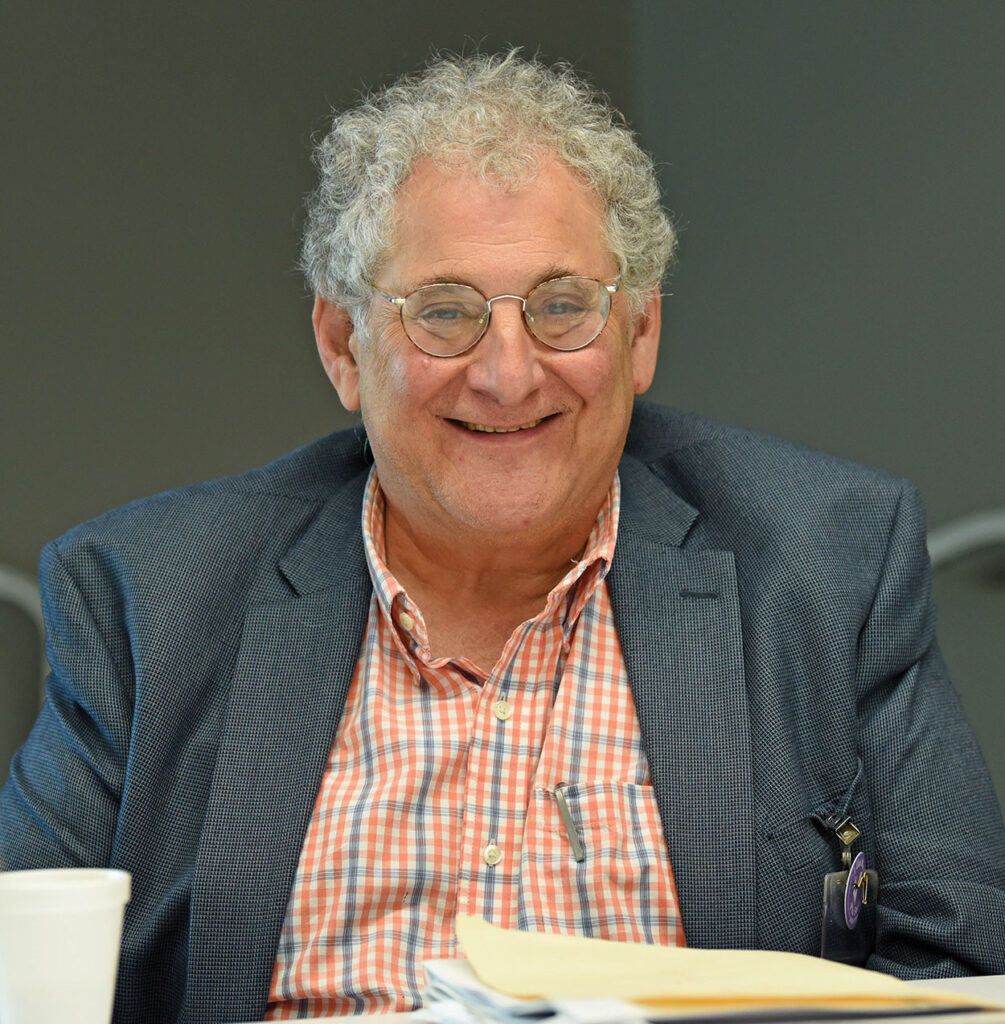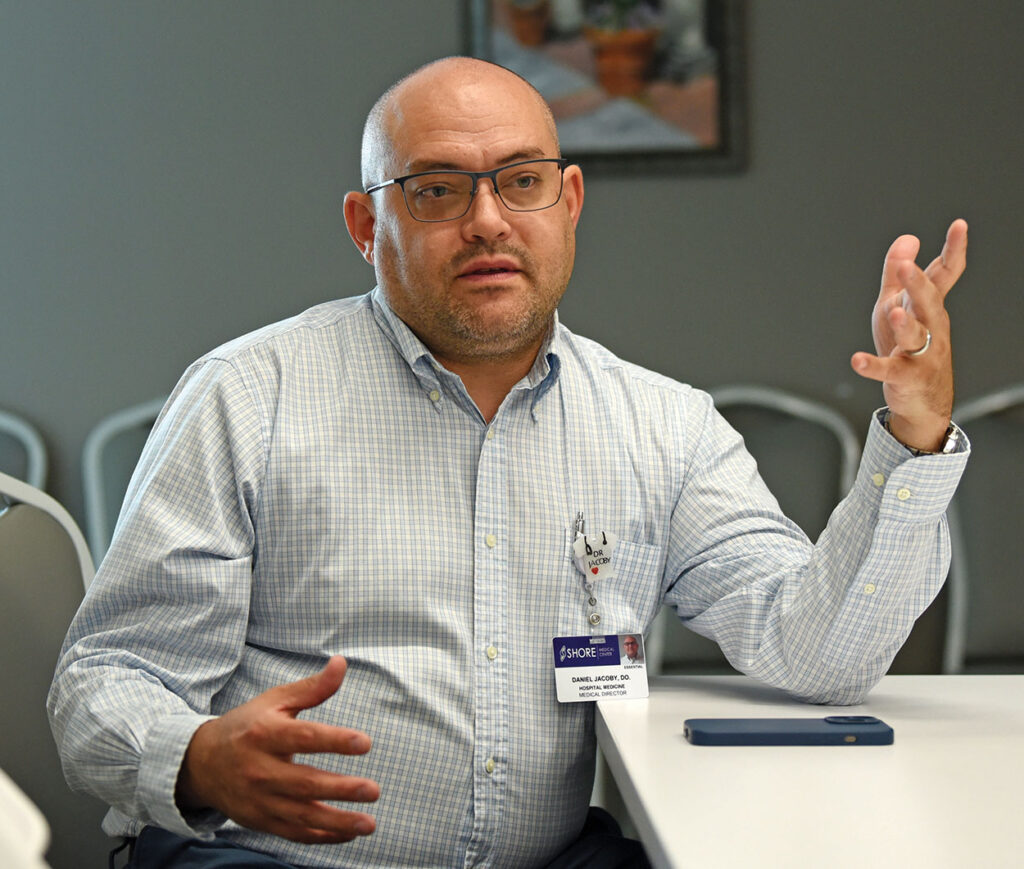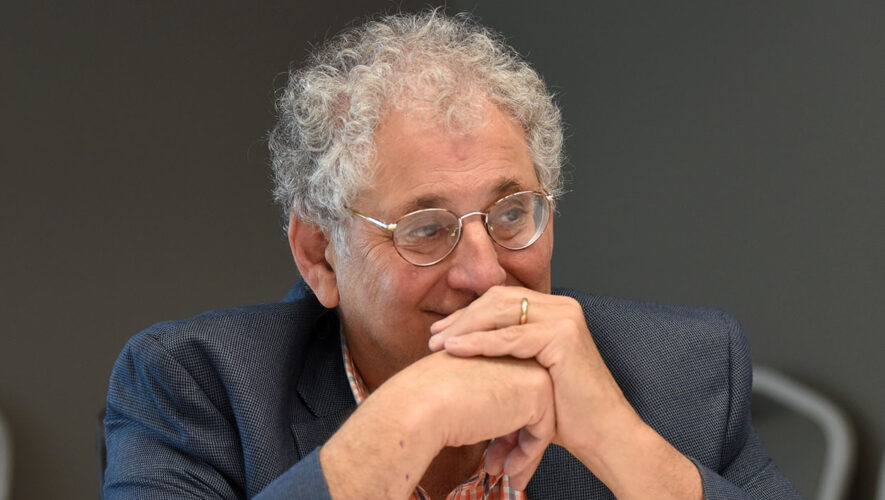Third-year med students from Philadelphia College of Osteopathic Medicine doing rotations in Somers Point
SOMERS POINT — The physicians in charge of third-year medical students doing their rotations at Shore Medical Center were drawn to this program because of their personal experiences. They believe it is critical to train future doctors in the craft of medicine and, equally important, the compassionate care of their patients.
This summer began the second year of the relationship between Shore Medical Center and the Philadelphia College of Osteopathic Medicine (PCOM). There are 10 students from PCOM spending 10 months shadowing physicians after having spent two years at the college immersed in lectures and book learning. Their third year is their first year of hands-on experience.
Medical student program benefits patients, hospitals, doctors
Philadelphia College of Osteopathic Medicine pleased with relationship
Dr. Leonard Galler, chairman of the the Clinical and Administrative Surgical Department at Shore, is the surgical adviser to the PCOM program. Dr. Daniel Jacoby, the medical adviser to the program, is the medical director for hospital medicine at Shore.
Galler is continuing a tradition he was privileged to experience back in medical school at Mount Sinai in New York City.

“I met doctors who taught me that part of medicine is being a student all the time and being a teacher all the time. If you want to basically do your job, part of it is to be a teacher and to be part of education,” he said in an interview last week with the Sentinel. “Every physician, in my opinion, has an obligation to pass on what they learn.”
Galler said he is the result of what he was taught and the PCOM students will be the result of what they are taught.
“The reason why I embrace education and promote these programs, and why I am pushing and have taken a leadership role in the PCOM here, is because we have an obligation and that is a serious obligation to have,” Galler said.
Jacoby is just as interested in medical education. When he was in his medical residency, he told the Sentinel last week, he chose to serve an extra year as chief resident.
“In that role I was in charge of all the medical education for the residents and also for the medical students who were rotating with our program. That involved doing teaching rounds, working directly with the students, teaching them how to interview patients, critiquing documentation, basically all the stuff that goes into being a doctor,” Jacoby said.

“I have had experience working with the students and residents in community-based medical centers so I kind of understood what Shore was going to need to do to bring students on board and to what an ideal experience for them was going to be like,” Jacoby added.
“When you’re practicing at an academic hospital, by definition you have all sorts of educational programs integrated into your clinical services, but for Shore it was a new endeavor,” Jacoby said. “We’ve had students here sporadically but we’ve never had a formal partnership and program like we have with PCOM.
“I was eager to get involved because I knew what it should look like and I wanted to make sure we did it right,” he said.
Galler said PCOM provides the students with a “rigorous curriculum.” What he wants these students to learn at Shore “is that they’e entering a noble field, it’s a field that is really a privilege to be part of.
“To be able to take over and be involved in somebody’s personal life, and to be involved when they’re sick, and to influence and benefit that, most of the time in a positive fashion, is really an amazing thing,” he said. “And that’s a gift because there are very few physicians (compared to the) billions of people.
“So what I want these students to walk away with is a moral and ethical knowledge of what they represent and what that means to patients.”
While the students do rotations in key core areas and elective rotations in specialties that hold their interest, there is a non-medicine part they are learning along the way.
“How to talk to a human being. How to understand differences in culture,” Galler said, whether it’s a soccer player from the local community or a visitor from Argentina or South Africa. The students get to see how their mentors deal with patients and learn from that.
More important, he said, is the students have a “responsibility” to learn. “The amount of terminology and education and understanding and thinking and the fact that drugs change every week is an enormous amount … to handle.
“She knows she’s not going to remember everything, but she’s learning how to handle that,” he said, pointing to Rylee McDonnell and referencing her and the other third-year students. “She will know, even if she knows nothing on day one of her internship, when the patient that comes in with … a big swollen leg, she’s going to know the process in thinking and where to go to get that information.”
Galler said they are working in groups and teams “because the amount of medical knowledge has exponentially gone crazy” so the students will have to learn not just from others but also with tools such as artificial intelligence (AI), but he cautioned not to worry about AI being in charge.
“This fear of AI doing medicine ain’t going to happen without a student or a doctor. They’re the ones who are going to interpret (what AI finds) because AI is terrific until you need it. And then you know it’s not really very bright,” he said, smiling.
These doctors in training will be using tools such as AI.
“And they are going to change how we do medicine because we as a country have shortages of doctors coming in all specialities, mostly in family health. We have to learn how to handle that,” Galler said, noting these up-and-coming doctors will be innovative.
Medical students today are learning there is more than medicine itself, such as dealing with insurance companies that have different objectives than doctors, satisfying accrediting bodies and even dealing with legislators who have passed laws limiting what doctors can do and could put them in jail for treating their patients in the most responsible way possible.
“That is the world she is ending up in. She is going to have to learn how to handle that,” Galler said, again pointing to McDonnell.
“You don’t get to be in her shoes without being, number one, very bright,” he added. “That’s a given. My job is to make sure they are more than bright, that they’re compassionate human beings.”
As he talked about McDonnell and the other future doctors, he paraphrased a saying in the Talmud, and a similar one in the Koran, to emphasize the importance of what they will do in their careers. “If you save one life, it’s as if you saved an entire world. And she’s going to be saving thousands of lives.”
The advantage of Shore for med students
Jacoby said the advantage of students spending their third year of college at Shore is the “one-on-one attention.”
He said it is the same argument when applying to colleges, small liberal arts versus large state or Ivy League schools.
“We’re the small liberal arts equivalent. You’re going to have a low ratio between students and teachers, you’re going to have front-line access to the patients, and in terms of a variety of experiences, it’s the whole gamut,” Jacoby said.
“We’ve been able to place our students in every sub-specialty elective that they want to see. If you want to see neurosurgery, you can be the first scrubbed assistant on the case. If you want to be outpatient doing sports medicine, looking at people’s twisted ankles, you can be right there with the doc bandaging people up,” he said.
“I think that’s really the main pull. And of course our community. Medical school is tough. Who wouldn’t want to spend their time at the beach if you can?”
Galler, Jacoby and Chris Wodazak, the core clinical campus coordinator, handle all of the administrative responsibilities of the students’ education at Shore Medical Center, with Galler focusing on the surgical side and Jacoby on the medical aspects. (Wodazak’s role is highlighted in a story in next week’s Sentinel.)
The three of them work to set up lectures, reach out to sub-specialists in different areas a medical student might not normally get a lot of exposure to, such as nephrology or rheumatology, Jacoby said, so students “can get a high-yield presentation from a practitioner who is out in the field.”
“One of the things I remember from medical school is that a lot of times you’re stuck in a textbook where you’re presented with the ideal conditions for practicing medicine and the textbook definition of a certain type of patient, but in the real world everyone is unique,” he said.
“Hearing from clinicians who are out practicing on a day-to-day basis, sharing their insights on how the typical problems present and how we solve them here in this community is really beneficial for the student.”
The trio also has to work with day-to-day regulatory requirements, student evaluations, credentialing and other things like that.
“Another part of it is just being a resource for the students when they have questions, thoughts about what they want to do in life, in terms of their medical specialities,” Jacoby said. “The third year of medicine is when you generally cement down what you want to do long-term. The residency application cycle, which is commonly referred to as ‘the match,’ really begins at the end of the third year, so any thoughts of different fields you want to go into, you need that exposure during your third year.
“It’s a really important period during the medical education, during medical school itself, so I’m always here to support, to discuss my path how I wound up in internal medicine and administrative medicine, connecting them with other specialists and other people that do different things.”
They also connect the students with more recent medical school graduates whose experiences are fresh in their minds and can speak to the students about aspects such as finishing medical school and doing their residencies.
“The fresh grads, they’ve just lived it, and they have a lot of unique insights,” he said.
As the students go through their rotations in different specialities and are considering which direction to go, the advisers also can provide guidance on what may be in store.
“It’s one thing to say I want to be a cardio-thoracic surgeon and crack people’s chests open and save lives, but the practicalities and realities of the training path — how many years it takes to get there, what the residency day-to-day life looks like — is a lot different between the specialties. That’s something we try to share with the students and give them insight,” Jacoby said.
“Everyone would love to be the most impressive, wisest, smartest, kind doctor out there, but there are so many different pathways and areas of need.”
– STORY and PHOTOS by DAVID NAHAN/Sentinel staff


